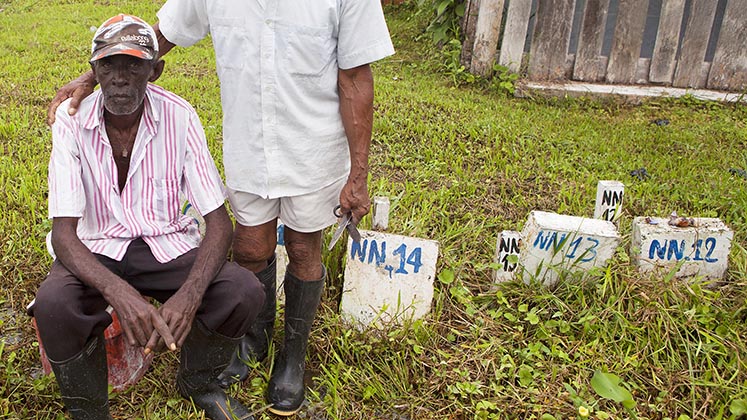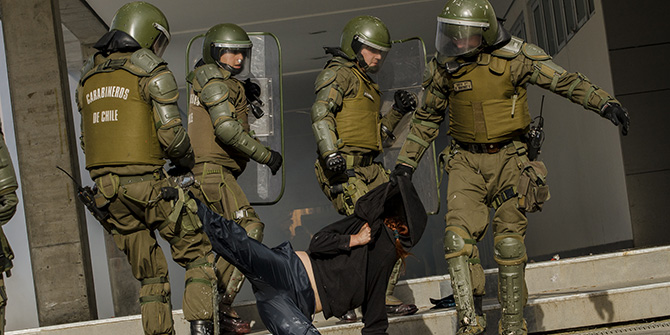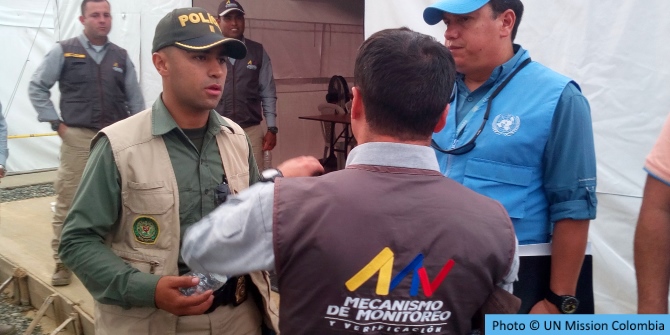 The current definition of enforced disappearance in international law was created with Latin American dictatorships in mind. But today its statist bias leaves it unable to respond to the many cases carried out by hybrid regimes where both state and non-state actors are involved. This undermines efforts to provide an effective legal response both for victims themselves and for the friends and families left to live with the terrible uncertainties of this devastating crime, writes Angelica Blasi.
The current definition of enforced disappearance in international law was created with Latin American dictatorships in mind. But today its statist bias leaves it unable to respond to the many cases carried out by hybrid regimes where both state and non-state actors are involved. This undermines efforts to provide an effective legal response both for victims themselves and for the friends and families left to live with the terrible uncertainties of this devastating crime, writes Angelica Blasi.
Enforced disappearance only achieved a clear status in international law because of the devastating wave of political crimes that swept across Latin American during the dictatorships of the 1970s. But despite the official legal definition established in the UN Declaration on the Protection of All Persons from Enforced Disappearance (1992), this abhorrent practice is still far from being eliminated. Rather, new configurations of the state are simply carrying out disappearances by more ambiguous means.

The cruel legacy of enforced disappearance
Enforced disappearance represents a particularly cruel and damaging crime, victimising not only the disappeared person but also wider networks of family and friends. The absence of a body and uncertainty around the victim’s whereabouts leave relatives especially in a state of perpetual fear and suffering, caught between the need for answers and the inability to mourn.
By depriving victims of their bodies, enforced disappearances erase the physical manifestation of identity, creating ghostly subjects that are neither dead nor alive. The anguished and unending doubt bequeathed to friends and family produces a devastating array of psychological consequences that can sometimes tear families apart.
This peculiarly pernicious psychological burden makes it imperative that effective legal mechanisms be put in place to combat this particular violation of human rights. Yet current patterns of enforced disappearances in Latin America raise real doubts about whether international law in its current from can respond adequately.
Hybrid states and international law
In 2010, the International Convention for the Protection of All Persons from Enforced Disappearance officially defined disappearances as:
The arrest, detention, abduction, or any other form of deprivation of liberty by agents of the State or by persons or groups of persons acting with the authorisation, support, or acquiescence of the State, followed by a refusal to acknowledge the deprivation of liberty or by concealment of the fate or whereabouts of the disappeared person, which place such a person outside the protection of the law.
However, because the need for international action on enforced disappearances stemmed back to political killings by the military dictatorships of Argentina, Chile, Paraguay, Brazil, and Uruguay, there was a strong emphasis on the state in this definition. It is precisely this emphasis that now debilitates the definition by failing to recognise thousands of genuine victims.
Since democratisation in Latin America, disappearances have gone from being a tactic of the state to become a means of inspiring terror also for non-state actors. Since these groups – like the armed gangs (maras) of El Salvador or paramilitaries and guerrilla groups in Colombia – are non-state, the disappearances for which they are responsible cannot easily be recognised as “enforced”, which undermines efforts to provide an effective legal response for these victims.

The case of Mexico
Mexico is a prime example of this phenomenon. The country has a clear pattern of widespread disappearances, and yet it also has one of the lowest rates of prosecution in the region. By late 2018, there were a total of 37,000 missing people, but only 1,300 cases had been opened by the special unit for disappeared people created in 2015. There had been zero convictions. Alarmingly, the number of missing persons has only continued to rise, with a total of over 60,000 in 2019.
While many disappearances can be linked to the police and armed forces, especially following the mass “War on Drugs” deployment under Calderón, a significant number are linked to non-state actors, especially the drug cartels. This non-state classification means that international law cannot respond.
Instead, these cases are considered merely “disappearances by individuals”, with no link to collective or state action. Since these are no longer “enforced” disappearances, they do not trigger the same legal mechanisms or more severe sentencing, with legal accountability differing for state and non-state actors. This failure to comply with the official definition effectively acts to “downgrade” the brutality of the offence, depriving victims and their families of the legal and social recognition that they deserve.
However, the reality of entrenched relations between organised crime and the state in Mexico raises serious doubts about whether such disappearances really do fall outside of the official definition. Indeed, the real problem is that the official definition falls outside the reality of how disappearances occur in contexts of hybrid governance. The reach and density of corruption creates an environment in which criminal non-state actors and the state become equal shareholders, making it increasingly difficult to establish clear boundaries between the state and organised crime.

The role of the hybrid state
This hybrid form of the state means that even if the direct perpetrator of a disappearance is not the state, it may still be involved in other ways.
In the case of Mexico, the state has been found to systematically obstruct the investigative process: tampering with evidence, manipulating figures, burying case files, and even blaming victims’ families for the fate of their loved ones. One infamous case was that of Guillermina Hernández, who in 2012 managed to personally hand a dossier about her disappeared daughter to the then presidential candidate Enrique Peña Nieto; the file was later found in the rubbish.
Negligent practices are not simply the product of underfunded state structures; they can also amount to deliberate and criminal obfuscation. Even if abductions and murders might be perpetrated by non-state agents, the hybrid state enables these agents to thrive and survive in contexts of insecurity, corruption, and ultimately impunity. By failing in its duty to prevent, prosecute, and repair, the state effectively contributes to the perpetration of these crimes.
It is therefore imperative that the official definition of enforced disappearance be revisited in order to promote safety and protection for those living in highly criminalised areas of Mexico, Latin America, and the wider world.
Notes:
• The views expressed here are of the authors rather than the Centre or the LSE
• Please read our Comments Policy before commenting





